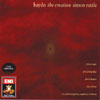Haydn (The) Creation
View record and artist detailsRecord and Artist Details
Composer or Director: Joseph Haydn
Label: EMI
Magazine Review Date: 4/1991
Media Format: CD or Download
Media Runtime: 99
Mastering:
Stereo
DDD
Catalogue Number: 754159-2

Tracks:
| Composition | Artist Credit |
|---|---|
| (The) Creation |
Joseph Haydn, Composer
Arleen Augér, Soprano City of Birmingham Symphony Orchestra City of Birmingham Symphony Orchestra Chorus David Thomas, Bass Joseph Haydn, Composer Philip Langridge, Tenor Simon Rattle, Conductor |
Composer or Director: Joseph Haydn
Label: EMI
Magazine Review Date: 4/1991
Media Format: Cassette
Media Runtime: 0
Mastering:
Stereo
DDD
Catalogue Number: EX754159-4

Tracks:
| Composition | Artist Credit |
|---|---|
| (The) Creation |
Joseph Haydn, Composer
Arleen Augér, Soprano City of Birmingham Symphony Orchestra City of Birmingham Symphony Orchestra Chorus David Thomas, Bass Joseph Haydn, Composer Philip Langridge, Tenor Simon Rattle, Conductor |
Author: hfinch
Here, though—and in the use of fortepiano—any resemblances between Hogwood and Rattle end. In the matter of details, Rattle's recording trusts the first published version of 1800 as regards orchestration, where Peter Brown, for Hogwood, views it as a mere souvenir edition, adding the contra-bassoon, trombones and double-basses which Temperley, for Rattle, sees only as ''local and temporary variations''. Rattle's CBSO Chorus is ungarnished by boys' voices. But it is not the inventory which matters. The real, resounding disappointment of Rattle's Creation is its air of impatience, rapid preparation, volatile pacing and poor balance.
Where Hogwood's rhythmic crispness gives impetus within and between movements, Rattle's, in its clipped chords, its over-phrasing and its garbled speeds, actually makes for a sense of creative stasis. The accompaniment to Gabriel's ''The marvellous work'' is more like a march than a paean of praise; woodwind solos are masked by over-prominent strings; the plot of the basses under Raphael's ''Be fruitful all'' desiccates the moist warmth of the main body of legato strings. Wilful and sudden accelerando heats Raphael's underwater scene, so that great Leviathan seems to have strayed into a dolphinarium.
The orchestral uneasiness and expressive short-cutting is picked up verbally. David Thomas's recitatives become almost Sprechgesang as the already idiosyncratic language is turned to ludicrously exaggerated rhetoric. The same temper touches the overdrawn ornamentation: his ''limpid brook'' becomes a nightmare of melismatic pollution. We hear more than enough, too, of Arleen Auger's nightingale and its soft enchanting lays. Auger's own contributions are lightweight, sometimes vocally under-nourished. Only Philip Langridge sings with a natural understanding of musical and verbal line.
Willcocks has chosen the Novello text. Here Novello himself removed the stains of van Swieten's own Englishing as he translated back, making his own ''corrections'' to facilitate sense and underlay. He thereby also scoured the text clean of the remaining Miltonisms, traces of the original lost English text written, it is thought, by Linley. Milton's ''tufty'' groves become merely shady, his balance of order and disorder is lost. In the majority of cases, though, the Novello text is more musically felicitous simply by being closer to the German which, although one stage back, was in fact the language in which Haydn actually weighed and measured his musical setting.
While Peters offer ''Here vent their fumes the fragrant herbs'', Novello replies with ''Here fragrant herbs their odour shed'', and this follows both the sense and the cadence of the German setting. Likewise, Peters' awkward ''In triumph sing the mighty Lord'' becomes in Novello ''Rejoice in the Lord, the mighty God''. Both, though, retain the grotesquely literal van Swieten translation ''Today that is coming speaks it the day'': still more detective work is clearly needed.
Willcocks's Creation is musically, too, still highly respectable, if a little dated in its coy choral enunciation, its fulsome (and over-resonant) orchestral playing, its conservative tempos. John Shirley-Quirk, Robert Tear and Heather Harper are more than worthwhile. But it is Hogwood whose eye for wondering detail, vivid pacing and balance of vocal and instrumental textures does most, in the end, to convince us of the case for English, however blurred its own authenticity.'
Discover the world's largest classical music catalogue with Presto Music.

Gramophone Digital Club
- Digital Edition
- Digital Archive
- Reviews Database
- Full website access
From £8.75 / month
Subscribe
Gramophone Full Club
- Print Edition
- Digital Edition
- Digital Archive
- Reviews Database
- Full website access
From £11.00 / month
Subscribe
If you are a library, university or other organisation that would be interested in an institutional subscription to Gramophone please click here for further information.





